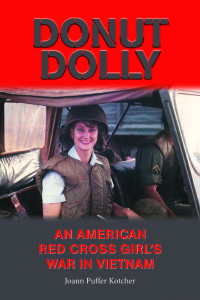By Shelby Stewart
Staff Writer
In the year that Joann Kotcher was in Vietnam, she almost died six times. That she is aware of.

These instances and more are documented in her book “Donut Dolly,” the narrative of her stint in Vietnam War, working with the American Red Cross to visit the soldiers overseas.
“We were the first women allowed in a combat zone,” said Kotcher. “We just went to visit, like you would when you visit someone in the hospital. They said it was like a letter from home.”
From 7-8 p.m., May 2, Kotcher will tell her story at the Brandon Township Public Library, 304 South St. register online or by calling the library at 248-627-1461
Kotcher and other women, also known as “Donut Dollys” by the soldiers they visited, worked seven days a week visiting the soldiers, and they moved around frequently from fox hole to fox hole across the country.
“I’m sure I never went to the same place twice,” she said.
The name Donut Dolly came from World War I when the American Red Cross and the Salvation Army sent women out to the rest areas in Europe to hand out snacks and visit. Two of the women handed out donuts as a snack to the soldiers, and it became a popular snack to hand out. In World War II, the women were commonly referred to as Donut Dollys by the men serving.
“This tradition continued into Korea, but in Vietnam, the Sarge said it was too damn hot to make them,” she said. “At the time, the new thing was pre-sweetened Kool-Aid packets that already had the sugar in them. We’d carry them in our pockets and just mix them with water.”
The most important thing that Kotcher says they did was just to talk to the soldiers. They would play games with them as well, and called themselves a vehicle for interaction. During her time in Korea, she had gone after the war was over and the soldiers were just bored and lonely. But during the Vietnam War, the women were sent in with the Soldiers and didn’t wait for any cease fire.
“It was 1964, I had graduated college with a degree in theoretical mathematics,” she said. “There wasn’t a job for a woman. You could be a telephone operator, a waitress, or a teacher. I wasn’t qualified to teach math, but I did and it was boring. I was looking for something interesting.”
And interesting doesn’t begin to explain her journey in the war.
“It was like being the hottest movie star in the world,” she said. “Whenever we wanted something or went some place, everyone just knocked themselves out to help us and appreciate us.”
Kotcher said that before thy were deployed, they were warned they would be treated like the queen of the world and to always be professional and only ask for what was needed and never take advantage of anyone.
“It was like being Marilyn Monroe,” said Kotcher.
